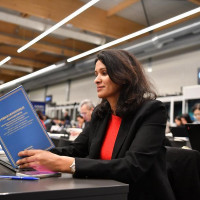- Thursday, 26 February 2026
Stop Politicising Foreign Policy
Foreign policy is a country’s fundamental principle and foundation for conducting relations in the international arena. Countries adopt well-defined foreign policies to serve their national interests abroad, based on which diplomacy and diplomats operate. As diplomacy is a form of political interaction in the international arena, it requires special skills, acumen, and expertise. In the modern globalised, interconnected and interdependent world, countries are required to have multiple engagements and relations with states, sub-states, and super-states as well as super-national entities like international and regional organisations. Sometimes diplomats are, thus, assigned to build relations with and engage even non-state actors.
Unlike in the past, the functions of diplomats are multi-dimensional and they are required to possess skills and knowledge to deal with diverse matters ranging from political, strategic, security, economic, trade, to climate change and technological issues. The job of a diplomat requires building contacts, interacting, and negotiating with state authorities and international organisations. Apart from general knowledge of everything, the ability to effectively communicate is the core of the quality of a diplomat.
Lacklustre performance
Nepal is often called a small country. It is definitely small compared to its two giant immediate neighbours. In reality, Nepal is a mid-sized country in terms of both physical size and population. There are 193 countries in the world, of which Nepal is bigger than over 100 countries. Similarly, Nepal’s diplomatic relations are with 185 states. Thus, Nepal’s exposure in the international arena is relatively impressive. However, some past experiences have shown that Nepal’s diplomatic effectiveness in enlarging its engagement in the community of nations and accordingly achieve its foreign policy goals has appeared to be glaringly lacklustre.
There are a number of instances where Nepal’s diplomatic fiasco was distinctly visible. One of them is in Bhutanese refugee issue. Nepal had consistently insisted that the refugees should have been repatriated to their own country. After years of impasse, Nepal had to finally agree upon the option of third-country settlement. Similarly, on the Lipulek-Kalapani issue, too, Nepal’s diplomatic acumen was not well reflected in a practical sense, despite tall rhetoric and hyperpolitics in the name of nationalism.
As the global geopolitical scenario has dramatically changed with Asia being the hotspot of international geopolitical rivalry, Nepal’s diplomatic challenges have further compounded. The present geopolitical scenario and international power balance are quite different from those of the past. The changed international scenario also demands newer thinking and a shrewd strategy, for which we also need to review our foreign policy approach and diplomatic tactics.
Foreign policy is not a static thing but a dynamic strategy of a country to serve the national interest. It thus demands review and change in the approach and strategy depending upon the events and developments in the international theatre. In the present situation, peace is what is needed for the security and development of countries and humanity. However, peace and security continue to be elusive as wars and conflicts in different parts of the world have ravaged the entire humanity. Big powers are instigating wars in the name of peace, whether it is in Ukraine, Gaza or other parts of the world.
In fact, big powers tend to instigate and support wars to maximise the profits of their arms industries. If there is no war, defence industries that manufacture weapons and military technology are likely to suffer profit as sales of weapons would drastically decrease in the global market. Arms industries can prosper only when more wars break out. While arms industries prosper and economies of arms-producing countries benefit from wars, humanity at large suffers. Wars and conflicts contribute to an increase in arms proliferation and trade, threatening the overall security and peace in the world. It may also give rise to the risk of nuclear wars.
Against this background, the foreign policy of countries needs to be focused on peacebuilding. Wars cannot bring about and guarantee peace and wars only breed more conflicts that cause human casualties and colossal collateral damage. It is only in sustainable peace, humanity can enjoy democracy, human rights, the rule of law, cooperation and development. Peace, thus, is a basic requirement for human prosperity for which global diplomacy has to be directed.
Nepal’s foreign policy aims at building and contributing to global peace and its diplomacy is accordingly directed. Nepal wants peace at home, peace in the region and peace in the world. It opposes wars and condemns terrorism of all forms and manifestations everywhere in the world. Nepal has been significantly contributing to the United Nations Peacekeeping mission in different parts of the world. Nepal has thus earned a reputation in the world as a peace-loving country.
Foreign policy is said to be the extension of domestic policy. Thus, domestic politics has a greater influence on foreign policy, although the foreign policy goals and priorities are guided by broader national interests. The core ingredients of national interest remain more or less permanent but the tactics and tools to protect national interests may vary depending upon the time and context. Nepal’s foreign policy goal has always been, as Leo E Rose said, ‘a strategy for survival’ right from its foundation. The founder of modern Nepal, King Prithivi Narayan Shah, set the tone of Nepal’s strategic and foreign policy goals and doctrine, which continues to guide us even in the present 21st century.
As Tim Marshal says, ‘countries are prisoners of geography’, the geographical position limits and leverages their domestic and foreign policy priorities. Prithivi Narayan Shah brilliantly defined Nepal’s position as being the ‘yam between two boulders’, suggesting that the country requires delicate balance and tight-rope walking in foreign policy and diplomatic handling with its immediate neighbours and the rest of the world. National interest is the fundamental goal of our foreign policy, which all political forces of the country adhere to. We, thus, need to refrain from hyper-politicising foreign policy and other sensitive matters, rising above narrow bureaucratic rigidity on issues of foreign policy goals and priorities.
(The author is a former chief editor of this daily and a former ambassador. lamsalyubanath@gmail.com)





-square-thumb.jpg)



-original-thumb.jpg)




-original-thumb.jpg)
